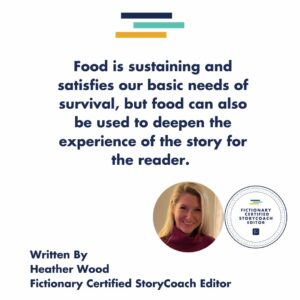
Recently, I found myself lingering over the images of food in the stories I read.
The sensory experience of the story told with the use of food connected me to the characters in unexpected ways, and I found myself turning the pages, wondering what else these meals would reveal.
Outside of the world of fiction, meals bring people together to connect, so it makes sense for writers to use meal times to connect their readers to their characters.

Why is food important?
Food is sustaining and satisfies our basic needs of survival, but it can also be used to deepen the experience of the story for the reader.
Because eating can be experienced through each of our five senses, the writer has much to work with when using food as an element in their story.
For further reading on using senses in writing, consider Shane Millar’s article of Fantasy Novel Basics here Settings for a Story: Fantasy novel basics and examples | Fictionary
Food can….
- Trigger Memory
- Create tension
- Characterize
- Create atmosphere
- Add to world building
- Foreshadow

What does this list look like in fiction?
When using food to trigger memory for a character, a writer might consider using it in a way that represented a moment of childhood as Delia Owens does in Where the Crawdads Sing:
“She walked to the kitchen and stood at the door. All her life the room had been warmed from baking bread, boiling butter beans, or bubbling fish stew. Now, it was stale, quiet, and dark. “Who’s gonna cook?” she asked out loud.”
In Donna Tartt’s Prologue to The Little Friend, tension and conflict are shown in the first line surrounding a meal:
“For the rest of her life, Charlotte Cleve would blame herself for her son’s death because she decided to have the Mother’s Day dinner at six in the evening instead of noon, after church, which is when the Cleves usually had it.”
Characterizing with food means understanding what food represents for your characters.
Finer meals, or those prepared with extreme effort might show the sophistication of a character. The very basic form of food might reveal the simplicity in a character’s nature.
Thomas Harris shows us a villain of some complexity in the well-known quote from his novel, The Silence of the Lambs:
“I ate his liver with some fava beans and a nice chianti.”
We are meant to cringe whenever this character takes control of the narrative, and this quote reveals Hannibal Lecter as a character who sees himself as more sophisticated than the average villain.

A strong setting creates the stage for a scene, with tone and atmosphere.
Amy Tan shows the importance of food used in setting and atmosphere in her novel, The Joy Luck Club:
“The hostess had to serve special dyansyin foods to bring good fortune of all kinds – dumplings shaped like silver money ingots, long rice noodles for long life, boiled peanuts for conceiving sons, and of course, many good-luck oranges for a plentiful, sweet life.”
Find more advice for writing strong settings here Five Setting Elements of a Story Explained | Fictionary
For those novels which take us out of our world and into another, food can be used for world building as J. K. Rowling shows us in the Harry Potter series.
The presence of pumpkin juice and butter beer at various events are distinct to this series, and Harry knows his magical world is a special transition from his muggle world with each feast he enjoys:
“He had never seen so many things he liked to eat on one table: roast beef, roast chicken, pork chops and lamb chops, sausage bacon and steak, boiled potatoes, roast potatoes, chips, Yorkshire pudding, peas, carrots, gravy, ketchup, and for some strange reason, mint humbugs.”
William Golding shows readers food as a foreshadow of downfall in Lord of the Flies:
“The littluns sat, solemnly thinking of meat, and dribbling. Overhead the cannon boomed again, and the dry palm fronds clattered in a sudden gust of hot wind.”
This basic human need shows the reader a coming break from innocence for characters who have, up until this point, resisted the temptations of power and rebellion.
The Importance of Taste Sense in Fiction
While foods can be used in many ways to connect to the reader and trigger a character through the sense of smell, sound, touch, and sight, food is most deeply experienced through the sense of taste. So, why is taste important in fiction?
Taste is the sense that brings all the other senses together. When we taste a food, we have already experienced the food in one or multiple ways…
- Hearing it cook and crackle on the stove
- Seeing it displayed on the dish
- Smelling it on a fork or spoon
- Feeling the texture of the food through touch
- Then the taste…
We taste food as a final culminating moment of experience, and using this knowledge of sensory details, we can write characters who show up as well rounded in this experience of food.

Raise the Stakes
A writer can use food to raise the stakes in their story, which becomes important in hooking the reader.
Without strong stakes for your characters, the story will fall flat.
Begin by showing how your character acts around food.
What does food mean to a character? A writer might consider how food is a source of abundance or privilege for a character, or perhaps the character uses food as an indulgence and luxury.
How a character acts around food reveals much about their nature. A writer might reveal characters with control issues through food, a selfishness with hoarding food. Or perhaps the writer reveals a generous nature of a character in the way they share a meal with others.
Conclusion
Writers have much to work with when considering how food can impact their story.
Appealing to the senses, deepening setting, and revealing character using food adds to that great pleasurable experience of being lost in a good story.
Article Written by Heather Wood
 By combining my experience of teaching writing at the secondary level with a Fictionary StoryCoach Edit, I will help you strengthen your story while honoring the care and effort you have dedicated to your art.
By combining my experience of teaching writing at the secondary level with a Fictionary StoryCoach Edit, I will help you strengthen your story while honoring the care and effort you have dedicated to your art.
Want to be part of a writing and editing community with kindness at its heart?
Do you know about the free Fictionary community? We’re connecting writers and editors who all speak the same story editing language.
You’re most welcome to join.
- Connect with other writers and editors
- Get your editing questions answered by Fictionary Certified StoryCoach editors
- Access free, live editing classes presented by editing experts
- Learn about all things Fictionary: product updates, videos, webinars, best practices


